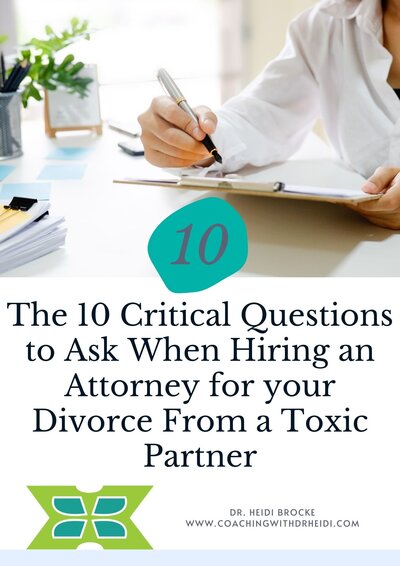This question came in from the state of Oklahoma via the Facebook page: “What is the best approach when sometimes you feel like someone in your life may be toxic and other times you feel like they’re not?”
Okay, being a coach in this particular category, I hear this all the time. And I’ll tell you, in my experience, I didn’t understand why my relationship played out the way it did. I know that when I was in it, I was thinking the same exact thing. One thing that we do need to know is, we all have the capability of having these toxic traits. Okay? We all have the capability of calling names, manipulating people to get our way, being mean and degrading. We have to know that everyone is probably toxic in certain situations in different periods of their life.
Now, what comes into play is if you are thinking you have someone in your life that may be unhealthy for you in the status that the relationship is in. I really want to you think about this. And start keeping track! Toxic traits are considered toxic or unhealthy or abusive if they are repetitive or if they are cyclic. Anyone who has ever been in any kind of abusive situation, you know that everything is a calm before the storm. You don’t dare stay happy very long, because it only takes a minute before the bottom drops out. So when you start seeing a repetitiveness in the toxic traits and a repetitiveness in the behavior, that’s when I would really start keeping track, to see if this relationship possibly may be not that healthy for you.
They will perhaps be calm and nice and thoughtful and seem to be caring for a bit, and you feel like, “Yes, finally they’re changing! The talk I had with them last week is finally sinking in, and they’ve finally heard what I’m saying!” And then about that fast…TADA…just kidding! They pull a big switch-a-roo and they are back to name calling and degrading and accusation and irrational demands and disregarding and downplaying your worth. And you sometimes don’t even have time to catch up. You’re like “Oh, I thought everything was fine. Whoa! How did that happen so fast?” How did it go from so good to so bad so fast? Those are the things you need to start watching for in a repetitive cycle.
Now, the toxic person as a whole has certain needs. And when those needs are not being met, that’s when the toxicity comes out. When they are feeling upset, when they are feeling stressed, when they are feeling out of control, when they are feeling threatened in any type of way…that’s when the character traits start coming out. And if you are the victim (for lack of a better term), or if you are involved with a person like this, that is when you are going to notice and you are going to question whether this relationship is healthy for you or not.
Now, remember, toxic relationships are not just spousal relationships or romantic relationships. Toxic relationships are in the workplace between coworkers; between bosses and coworkers; they can be between friends; they can be between siblings; they can be between parents and kids; there are all kinds of toxic relationships.
That being said, if you feel like there is one or more, start watching for cycles! If you notice repetitive behavior, then you start watching what is going on in that person’s life when the toxicity comes out. Because they are never going to accept responsibility or blame themselves for the bad things that are going on in their life. They will find somebody else to blame and they will find somebody else to accuse. And, usually, that’s when you are going to start noticing the cycle.
It’s control and attention, admiration and power. Those are the things a typical toxic person will seek out, and if they are not getting those, that’s when you’re going to see the toxicity cycle flare up.
So, in answer to your question…What is the best approach when you feel someone in your life may be toxic and at others times you feel they may not be? The best approach is to educate yourselves on the characteristics and start watching for the cycle. And if you have to, document it, just so that you remember. We tend to talk ourselves out of it and give other people the benefit of the doubt. So if in doubt, you’re the one that needs to make the decision whether the relationship is healthy for you. No one else can make that decision for you. So I encourage you to start paying close attention and really, really thinking about the actions of the toxic person.
Thank you for that question! That was perfect for this post! If you do have questions for me, you can get to me through my Instagram or through my Facebook. They are both @coachingwithdrheidi, you can message me there. I will not be saying any names of people as questions come in. The other place you can ask your questions is through my website on my contact form!









+ view comments . . .